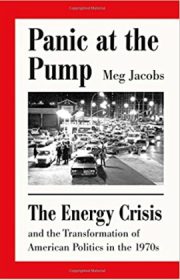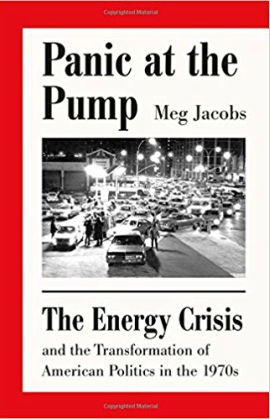About the Book — In Panic at the Pump, Meg Jacobs shows how a succession of crises beginning with the 1973 Arab oil embargo prompted American politicians to seek energy independence, and how their failure to do so shaped the world we live in. When the crisis hit, the Democratic Party was divided, with older New Deal liberals who prized access to affordable energy squaring off against young environmentalists who pushed for conservation. Meanwhile, conservative Republicans challenged both kinds of governmental activism and argued that there would be no energy crisis if the government got out of the way and let the market work. The result was a stalemate in Washington and panic across the country: miles-long gas lines, Big Oil conspiracy theories, even violent truckers’ strikes.
Jacobs argues that the energy crises of the 1970s became, for many Americans, an important object lesson in the limitations of governmental power. Washington proved unable to design a national energy policy, and the inability to develop resources and conserve only made the United States more dependent on oil from abroad. As we face the repercussions of a changing climate, a volatile oil market, and continued unrest in the Middle East, Panic at the Pump is a necessary and instructive account of a formative period in American political history.
About the Author — Meg Jacobs is a research scholar in the Woodrow Wilson School at Princeton University. Her first book, Pocketbook Politics: Economic Citizenship in Twentieth-Century America (2005), won the Organization of American Historians’ Ellis W. Hawley Prize for the best book on political economy, politics, and institutions of the modern United States, as well as the New England History Association’s Best Book Award.



